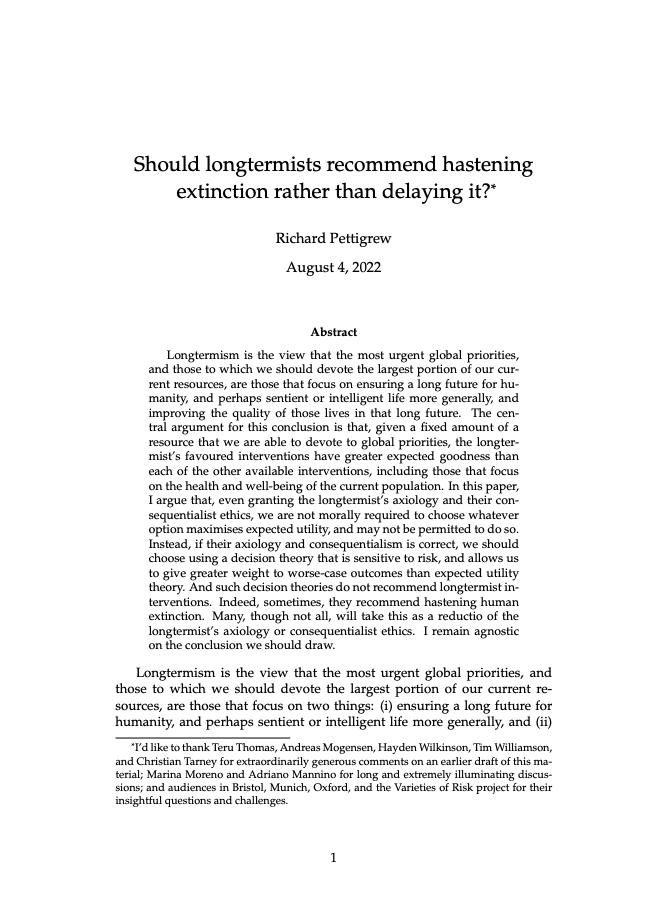Should longtermists recommend hastening extinction rather than delaying it?
Richard Pettigrew (University of Bristol)
GPI Working Paper No. 2-2022, forthcoming at The Monist
Longtermism is the view that the most urgent global priorities, and those to which we should devote the largest portion of our current resources, are those that focus on ensuring a long future for humanity, and perhaps sentient or intelligent life more generally, and improving the quality of those lives in that long future. The central argument for this conclusion is that, given a fixed amount of a resource that we are able to devote to global priorities, the longtermist’s favoured interventions have greater expected goodness than each of the other available interventions, including those that focus on the health and well-being of the current population. In this paper, I argue that, even granting the longtermist’s axiology and their consequentialist ethics, we are not morally required to choose whatever option maximises expected utility, and may not be permitted to do so. Instead, if their axiology and consequentialism is correct, we should choose using a decision theory that is sensitive to risk, and allows us to give greater weight to worse-case outcomes than expected utility theory. And such decision theories do not recommend longtermist interventions. Indeed, sometimes, they recommend hastening human extinction. Many, though not all, will take this as a reductio of the longtermist’s axiology or consequentialist ethics. I remain agnostic on the conclusion we should draw.
Other working papers
The long-run relationship between per capita incomes and population size – Maya Eden (University of Zurich) and Kevin Kuruc (Population Wellbeing Initiative, University of Texas at Austin)
The relationship between the human population size and per capita incomes has long been debated. Two competing forces feature prominently in these discussions. On the one hand, a larger population means that limited natural resources must be shared among more people. On the other hand, more people means more innovation and faster technological progress, other things equal. We study a model that features both of these channels. A calibration suggests that, in the long run, (marginal) increases in population would…
The cross-sectional implications of the social discount rate – Maya Eden (Brandeis University)
How should policy discount future returns? The standard approach to this normative question is to ask how much society should care about future generations relative to people alive today. This paper establishes an alternative approach, based on the social desirability of redistributing from the current old to the current young. …
Moral demands and the far future – Andreas Mogensen (Global Priorities Institute, Oxford University)
I argue that moral philosophers have either misunderstood the problem of moral demandingness or at least failed to recognize important dimensions of the problem that undermine many standard assumptions. It has been assumed that utilitarianism concretely directs us to maximize welfare within a generation by transferring resources to people currently living in extreme poverty. In fact, utilitarianism seems to imply that any obligation to help people who are currently badly off is trumped by obligations to undertake actions targeted at improving the value…

